View from the Pew

Contents [hide]
- 1 Meet the Author
- 2 Some Thoughts on Christmas
- 3 Some Thoughts on the Incarnation
- 4 Some Thoughts on Looking for Help
- 5 Some Thoughts on Hope: Because He Lives
- 6 Some Thoughts on Joy
- 7 Some Thoughts on Peace
- 8 Some Thoughts about Truth
- 9 Some Thoughts on Peter’s Denial
- 10 Some Thoughts on Trusting God in the Storm
- 11 Some Thoughts on Thankfulness
- 12 Some Thoughts during the Pandemic
- 13 Some Thoughts during Easter 2020
- 14 Some Thoughts on the Coming of Christ
- 15 Some Thoughts on Evangelism
- 16 Some Thoughts on Self Worth
- 17 Some Thoughts on Faith
- 18 Some Thoughts on the Authority of Scripture
- 19 Some Thoughts on Finding Strength in God
Meet the Author
 |
Nancy Stephens grew up in the Anglican Parish of Derby & Blackville and has served with the Overseas Missionary Fellowship (OMF) for 30 years. After several years of cross-cultural ministry in Thailand, she is retired from OMF’s Personnel Department, and resides in Fredericton, NB. You can learn more about the OMF at https://omf.org/ca/
|

Some Thoughts on Christmas
There is a danger that the Christmas story has become so familiar to us that we overlook it in all the busyness of the season. Of course, we know that Christmas is a celebration of the birth of Jesus Christ. But it is still easy to get so caught up in the festivities that we do not take time to think much about the deeper meaning of His birth.
Who is this child born in Bethlehem? Let’s consider the names given to Him in the Christmas narratives.
“But the angel said to her, “Do not be afraid, Mary, you have found favor with God. You will be with child and give birth to a son, and you are to give him the name Jesus.” (Luke 1:30-31)
Jesus is the Greek form of the Hebrew name “Joshua” which means “the Lord saves.” The meaning of His name is highlighted in the angel’s words to Joseph: “She will give birth to a son, and you are to give him the name Jesus, because he will save his people from their sins.” (Matthew 1:21)
“Jesus” was a common name and there may have been many little boys running around Palestine with the same name. But this Jesus is unique. The angel explained to Mary: “The Holy Spirit will come upon you, and the power of the Most High will overshadow you. So the holy one to be born will be called the Son of God.” (Luke 1:35)
The meaning behind the title “Son of God” is further explained in the words “All this took place to fulfill what the Lord had said through the prophet: ‘The virgin will be with child and will give birth to a son, and they will call him Immanuel’—which means, ‘God with us.’” (Matthew 1:22-23)
Who is this child? The names given to Him say it all! He is Saviour. He is Lord. He is God in human flesh. There are many religions in the world with many different ideas of how people can reach God. But in Christianity, it is God who reaches down to us through His Son Jesus.
Christmas is a time of giving gifts. God gave us the ultimate gift on that very first Christmas when He sent His Son into our world. As with all gifts, God’s gift of His Son is meant to be received, opened and made part of our lives. We do that when we allow our faith to impact us at every level of our hearts, souls, minds and bodies.
As we read in John, “He came to that which was his own, but his own did not receive him. Yet to all who received him, to those who believed in his name, he gave the right to become children of God— children born not of natural descent, nor of human decision or a husband’s will, but born of God.” (John 1:11-13) This is possible because the Babe of Bethlehem came not just to live in our world, but to die for our sins and bring us into a right relationship with our Heavenly Father.
May we welcome Him with joy into our lives and into all our celebrations this Christmas Season.
© Nancy Stephens December 2024
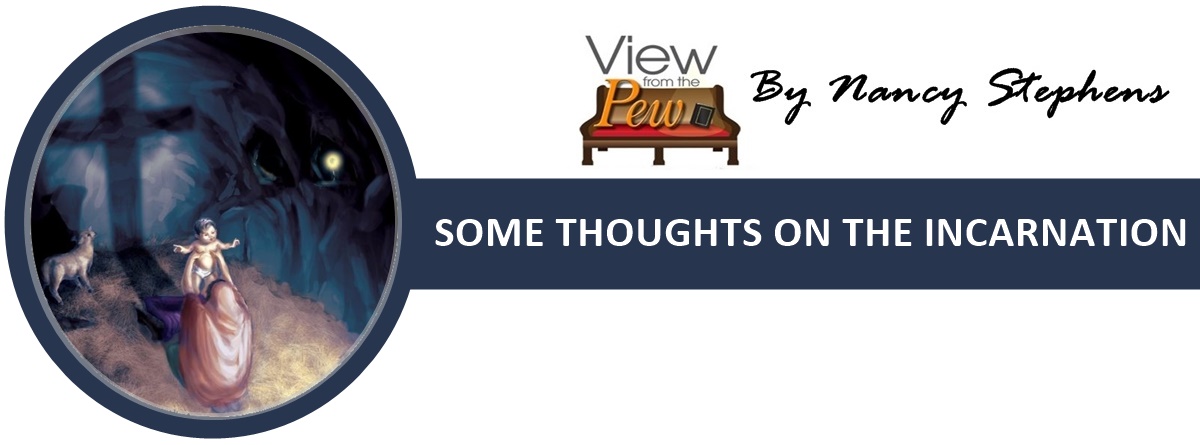
Some Thoughts on the Incarnation
As I journey through another Advent Season and prepare my heart to celebrate Christmas, I find myself pondering once again the wonder and mystery of the day when “The Word became flesh and made his dwelling among us.” (John 1:14) I never cease to marvel that the baby born to Mary and placed in a manger was none other than God Himself! Our invisible God became visible when He took on our human nature and walked the earth as one of us. Of course, He didn’t start out walking. As any baby, He had to learn to walk, to talk, to play, etc. He did not take a short cut to adulthood. Neither was He born into a comfortable, well-off family. No, He was born into a fragile family situation and spent time as a refugee in Egypt, before settling into a routine family life with Mary and Joseph in the small town of Nazareth. What an amazing journey for the Son of God, experiencing the ups and downs of what it means to be human.
Though Jesus was born as one of us, make no mistake about it, He was still God. The New Testament clearly portrays Jesus in the fullness of His deity as the Second Person of the Godhead. One of my favourite passages describing this miracle of the incarnation is found in Hebrews 1:3 – “The Son is the radiance of God’s glory and the exact representation of his being, sustaining all things by his powerful word.”
The “radiance of God’s glory” – when I think of the word radiant, I think of light and beauty. God’s glory speaks of His holiness, love, compassion, mercy, justice, purity…and the list could go on. Jesus reflected all of these attributes in His words and actions. The disciples were slow to understand who Jesus really was, but they gradually pieced it together over the three years they spent with Him. Peter declared, “You are the Messiah, the Son of the living God.” (Matthew 16:16) John wrote, “We have seen his glory, the glory of the one and only Son, who came from the Father, full of grace and truth.” (John 1:14)
The “exact representation of his being” – the Greek word here comes from a word meaning to “engrave,” as when making a stamp or coin which denotes the authenticity or reality behind the stamp. When we see Jesus, we see God – not a copy or cheap imitation, but the actual embodiment of God – Emmanuel – God with us.
“Sustaining all things by his powerful word” – In creation, God spoke the word and the heavens and earth, the sun, moon and stars, the plants and animals and human beings all came into existence. In the same way, Jesus spoke a word and people were healed, sins were forgiven and the dead were raised to life!
The fact that Jesus lived over 2000 years ago may cause us to think of Him as a figure from ancient history, maybe like Alexander the Great. A great figure in his time, but pretty far removed from us today. But Jesus is much more than a prophet from long ago. He is the eternal Son of God. In His own words, Jesus declared, “I am the Living One; I was dead, and now look, I am alive for ever and ever!” (Revelation 1:18)
The light that shone that first Christmas was not just the star of Bethlehem. It was Jesus, the “Light of the world.” His light still shines today. “For God, who said, ‘Let light shine out of darkness,’ made his light shine in our hearts to give us the light of the knowledge of God’s glory displayed in the face of Christ.” (2 Corinthians 4:6) If you wonder what God is like, read the Gospels and see Him in the words and actions of His Son Jesus. And as you read, picture it not as a story from long ago, but as a reminder that Jesus is reaching out to you with the same love and compassion today. In words from “Old Little Town of Bethlehem,” one of my favourite Christmas hymns, may we contemplate afresh the mystery of the Incarnation:
How silently, how silently, the wondrous gift is given
So God imparts to human hearts the blessings of His heaven
No ear may hear His coming, but in this world of sin
Where meek souls will receive him still, the dear Christ enters in.
© Nancy Stephens December 2022

Some Thoughts on Looking for Help
We’ve all heard the saying, “Good help is hard to find!” This seems especially true these days, with the labour market reduced due to the prolonged pandemic and the retirement of so many Baby Boomers. Ask any business owner in the food and retail industries and they will attest to how difficult it is to find good help.
There is also the saying, “If you want something done right, do it yourself!” That sentiment is certainly alive and well in our day and has spawned a whole DIY industry with a plethora of books, tutorials and YouTube videos showing us how to fix things ourselves. And if we need help with emotional or mental health issues, we can easily find a whole host of counselors, psychologists, therapists, gurus, psychics, etc. offering their services to help us overcome our problems. For that last list, I say buyer beware!
Maybe you are like me, I like to be self-sufficient and not have to bother others with my problems. But the truth is, everyone needs help from time to time. So where do we turn in those times? I like the Psalmist’s approach:
I lift up my eyes to the mountains—
where does my help come from?
My help comes from the Lord,
the Maker of heaven and earth.
Psalm 121:1-2
The first place I look for help is to the Lord. Believe it or not, I pray about even mundane things like who would be a good person to call for house repairs, or which car dealer to trust, or where to find an item I need to purchase. Maybe I do this because I’m single and don’t have a husband to ask! Still, I find it very helpful to pray for God’s guidance in matters both big and small. For me, this is the starting point. I invite God into my problems and trust Him to guide me to the right solution.
Of course, reaching out to an invisible God takes faith – faith that God is there, that He cares about me and whatever situation I may be facing and that He can help me. I believe all three of these things. Why? Because the Bible tells me so! And because I believe, I dare to call out to God whenever I need help. I know I’m on the right track when I read verses such as, “…call on me in the day of trouble; I will deliver you, and you will honor me.” (Ps. 50:15) God actually likes it when we call out to Him for help because it shows Him that we know we need Him.
As I said, asking God for help is the starting point. The next step may be to reach out to people for help. It’s not always easy to admit that we need help. Perhaps we think it is a sign of weakness or we don’t want to “bother” others with our problems. Or maybe we have sought help from someone in the past and been disappointed with the response. Whatever the reason behind such reluctance, I think it’s important to realize that God often sends us the help we need through other people. Certainly, as part of the Family of God, we are called to help each other. That may mean offering practical hands-on help with something or it may mean coming alongside to encourage and pray for someone.
Often, when I pray for others, rather than telling God what to do, I simply ask Him to send them the help they need. If that person is nearby, I may end up being the answer to my own prayer! If that person is a world away, I trust that God will use someone else to meet their need.
Looking for help? Start with God. “Let us then approach God’s throne of grace with confidence, so that we may receive mercy and find grace to help us in our time of need.” (Hebrews 4:16)
© Nancy Stephens August 2022

Some Thoughts on Hope: Because He Lives
The past two years in this pandemic have certainly cast a pall of doom and gloom over our lives. As if that were not bad enough, now we are facing the ominous threat that Russia’s invasion of the Ukraine will spark another world war. Then there are the “normal” trials and personal problems many face – sickness, financial pressures, marital issues, grief, regrets, etc. Add to all of this the runaway inflation and rising interest rates, and the future has never looked so bleak!
Despite all these things, I believe we can still have hope. Not the wishful thinking kind, where we cross our fingers and hope for better days, or knock on wood and hope our luck will not run out! No, I am talking about the hope that comes from having faith in Jesus Christ. We have just remembered His death and celebrated His resurrection. Easter is not just a date on the church calendar. It is the turning point of history! As the worship song goes, “Because He lives, I can face tomorrow!” (Song by Bill Gaither) It is good to remind ourselves that Jesus is the source of our hope for this world and for the world to come.
The Bible tells us, “Now faith is confidence in what we hope for and assurance about what we do not see.” (Hebrews 11:1, NIV)
Consider that the words “faith…confidence…assurance” are all closely linked to “hope.” This speaks to me of the elements that make up hope – having faith in God, being confident in His character and taking comfort from knowing that He holds all things in His hands. We cannot see the future, but He can. By faith, I put my hope in God, that He is at work in every situation and will bring me through it all to be with Him forever. This is not an escape route from problems, but rather a guarantee of safe passage because Jesus is always with me. This hope is available to each of His followers and provides stability for our lives, as “an anchor for the soul, firm and secure.” (Hebrews 6:19, NIV)
The Apostle Paul’s benediction gives us even more food for thought:
“May the God of hope fill you with all joy and peace as you trust in him, so that you may overflow with hope by the power of the Holy Spirit.” (Romans 15:13, NIV)
God is the source of hope. He is the one who creates this hope in our hearts. And not only “hope,” but “joy and peace” too! How? Through our trust in Him. Faith is not just about head knowledge. Knowing about God is not the same as knowing God. When faith moves from our heads to our hearts, it deepens our trust in God. We exercise trust in something when we are confident that it is reliable, that it will stand up to the pressure or test. We may “believe” in the sturdy construction of a chair, but we do not really “trust” in it until we sit down and let it hold our full weight! This is the kind of trust God wants us to have in Him. Rather than leaning on our own strength, He wants us to lean on Him and trust Him with every aspect of our lives. He longs to take our fears, our anxieties, our pain, our sorrow, our disappointments and anything else that burdens us and replace them with His hope and joy and peace.
I love it that Paul uses the words “overflow with hope.” God does not dole out His blessings by dribs and drabs! He lavishes them on us – so we can have more than enough to share with others as well! How is this even possible? Paul tells us that it is through “the power of the Holy Spirit.” When we read the Book of Acts, we see what happens when people are filled with the Holy Spirit. The disciples went from hiding from the Jewish authorities to preaching about Jesus on the streets of Jerusalem! Okay, we may not aspire to be street preachers, but the point is that when we cooperate with the work of the Holy Spirit in our lives, He can do amazing things, like replace our fears with hope. As followers of Jesus, let us be known not for our fears and pessimism, but for our hope and joy…because He lives!
© Nancy Stephens May 2022

Some Thoughts on Joy
Is it just me or do you share my feelings that 2022 is off to a rocky start? As the pandemic drags on, Omicron seems to have sucked the energy out of life. Going back into more restrictions is challenging, especially when we had hoped vaccines and booster shots would get us over the hump. Add to that the personal problems we may face, perhaps sickness, financial pressures or family issues, there are lots of reasons to feel anxious. We live in challenging times, so some level of stress is inevitable. However, accumulated stress can sometimes lead to more serious forms of worry or anxiety. One of the ways I try to prevent that in my life is to turn to the Scriptures. Filling my mind with God’s Word helps to drive out negative thoughts that begin to creep in.
A verse that has stuck in my mind lately is Nehemiah 8:10, especially the words “for the joy of the Lord is your strength.” Thinking about joy is a good antidote to worry! I believe joy is more than a superlative of happiness, as if it were a matter of quantity, so that more happiness equals joy. I think they differ in nature. Happiness depends mostly on our circumstances, but joy can exist even when we experience hard times. Otherwise, James would not have said “Consider it pure joy, my brothers and sisters, whenever you face trials of many kinds.” (James 1:2) This speaks of resolve or determination to have a joyful attitude, which I must admit is easier said than done! Still, it helps me see that joy is not simply an emotional feeling of being content. Nor is it a type of Pollyanna glad game where I try to look on the bright side. And it is not the power of positive thinking either. Rather, I think James is pointing to joy as a perspective on life that is rooted in faith and trust in God, that He really does love me and will never abandon me no matter what happens.
My musings on joy brought back a childhood memory. My parents led the Sunday School in our church for decades. I can remember my father teaching us an acronym for JOY – Jesus, Others and You. In other words, we find joy by putting Jesus first, others next and ourselves last. Following this very Biblical exhortation goes a long way to helping me get the focus off my own problems.
The phrase “the joy of the Lord” points clearly to God as the source of joy. It is not something that I can manufacture by myself. Rather, as Paul tells us, joy is one of the fruits of the Spirit. (See Galatians 5:22.) That means the Holy Spirit is working to produce joy in my heart. How can I cooperate with Him in that? Keeping with the agricultural metaphor, I can put my roots down deep into God’s Word. As I said above, I find that filling my mind with scripture helps combat a rise in negative self-talk, which is a seed bed of worry in times of stress. Also, instead of talking to myself, I can talk to God about my worries, as Peter exhorts, “Cast all your anxiety on him because he cares for you.” (1 Peter 5:7) Having done that, of course, it is important not to take them all back again at the end of my prayer!
In John 15, Jesus teaches His disciples that obedience is key to staying connected to Him. He goes on in verse 11 to say, “I have told you this so that My joy may be in you and that your joy may be complete.” This speaks again of the source of our joy. As the Sunday School chorus reminds us, “there’s no other way to be happy in Jesus, but to trust and obey.”
Many people think God is a “kill-joy” out to make us miserable. Nothing could be further from the truth! He longs to pour the fullness of His joy into our lives. Zephaniah gives us an amazing description of God rejoicing over His people with singing! (Zephaniah 3:17). God delights in me! I embrace this thought and find that it kindles a deep joy within my own heart.
I think it is well known that stress and anxiety have a negative impact on us both physically and psychologically. On the other hand, joy lifts our spirits. Scripture puts it this way – “A joyful heart is good medicine, but a crushed spirit dries up the bones.” (Proverbs 17:22 in ESV) I readily admit that I am not qualified to speak to the more serious issues of mental health, such as clinical depression. I simply share with you the way I seek to find the strength of heart and mind to face my worries, especially in the dead of winter!
© Nancy Stephens January 2022
This is a link to the children’s hymn that Nancy mentions in her column above:

Some Thoughts on Peace
“Glory to God in the highest, and on earth peace, good will toward men.” (Luke 2:14, KJV)
Peace on earth – that is part of the Good News that the angels announced to the shepherds the night that Jesus was born. Peace? Here on earth? Really? At first glance, it can seem like an empty promise, especially since the world continues to experience conflict on every level. The news is full of reports of tension between countries, wars and unrest within nations, domestic violence within families, anxiety and turmoil within individual hearts. Still, I believe there is peace to be found, if we know where to look.
The birth of Jesus put into motion God’s plan of redemption. Because of Jesus’ death and resurrection, all who believe in Him are reconciled to God. In Romans 5:1, Paul explains that “since we have been justified through faith, we have peace with God through our Lord Jesus Christ.” Peace with God means that we are no longer enemies of God. Our sins are forgiven and we are made part of His family, with the full rights and privileges of a child of God. Of course, there are responsibilities too! We are called to walk in the light, to cooperate with His work in our lives, to bear fruit that brings glory to Him, etc. But the really Good News is that we are not left to do this in our own strength. God enables us to live lives that please Him through His Spirit who indwells us and gives us the strength and grace that we need day by day.
If we believe in Jesus, not only do we have peace with God, but we also have what it takes to live at peace with others. No doubt, we have all had lots of experience with challenging relationships in our families or work places. Perhaps we carry the scars of a difficult childhood, a wrong friendship, a broken promise, a bad marriage, etc. Relationships are damaged in many ways – through harsh words, gossip, lies, jealousy, anger, resentment, etc. Life can be messy! The Bible has a lot to say about loving others, about forgiving those who hurt us, about letting go of the desire to get even and trusting God to deal with things as He sees best. Paul exhorts us, “If it is possible, as far as it depends on you, live at peace with everyone.” (Romans 12:18) In other words, we should be the ones to take the first step to mend a broken relationship. Of course, others may resist our attempts, but that is on them.
Paul emphasizes this as especially important within the church – “Be completely humble and gentle; be patient, bearing with one another in love. Make every effort to keep the unity of the Spirit through the bond of peace.” (Ephesians 4:2-3) How many disagreements within the church could be avoided if we all practiced this!
In addition to peace with God and peace with others, we can also have peace within our own hearts. Sometimes this inner peace is the most elusive. Knowing we are forgiven by God is a wonderful thing! But sometimes we struggle to forgive ourselves and are unable to move beyond our regret. Or perhaps the stresses of life, rob of us of peace. Present troubles or an uncertain future may lead us to give way to worry, anxiety, despair, etc. The Good News is that nothing that has happened in the past or that may happen in the future can separate us from His love. His grace really is sufficient for all of our needs, if we will but look to Him for His grace to help in every situation.
God has not promised His children an easy life, but He has promised peace on earth – a “peace that passes understanding.” (Phil 4:7) We can have peace with God, with others and with ourselves. How? The angels pointed the shepherds to Jesus and that is exactly where we need to look too!
© Nancy Stephens December 2021

Some Thoughts about Truth
Lately, I have been thinking a lot about truth. How do I know if something is true? My first instinct is to consider the source. Is it trustworthy? Of course, that is not always easy to decide, especially in a time when there is so much “fake news” circulating. Unfortunately, what former President Trump used as a term to make his supporters doubt the main media’s coverage of his presidency has encouraged people to pay more attention to news sources that are less than reliable. But just because something is circulating on the web or other social media platforms does not make it true. Of course, it doesn’t mean it isn’t true either! So how do we know what to believe? Personally, I stick to the main media sources that have a good reputation for getting the facts right. Are they perfect? No. Still, I think they are less apt to skew their stories to support a hidden agenda. They just cover the news.
I think it is readily apparent that our society is drifting further and further away from its Judeo-Christian roots which were firmly embedded in a belief in God. Abandoning faith in God leaves people with a spiritual vacuum that craves something to fill it. G. K. Chesterton once said, “When people stop believing in God, they don’t believe in nothing, they believe in everything.” That kind of mentality leads people to be easy prey for “fake news” and wild conspiracy theories, such as those being circulated by QAnon.
One of the consequences of this undermining of truth is a general scepticism about anything coming from official sources. Medical experts are ignored. Science is trashed. Some people would prefer to take a chance on chloroquine or ivermectin, rather than to trust the science behind the new mRNA vaccines. I thank God for scientists with the knowledge needed to develop vaccines. Where would this world be if we did not have modern medical science? Vaccines have delivered us from the scourge of cholera, diphtheria, measles, polio and many other diseases that have plagued our world in the past. I realize that not everyone can take a vaccine, so I am not promoting mandatory vaccinations. But, in my view, the vaccines against Covid-19 are gifts from God. He is the One who has enabled people not just to discover the medicinal properties of plants and minerals to develop medicines, but also to unlock the mysteries of the human genome to produce more effective vaccines. I am not saying that scientists are gods. They are not. There is only one God – the Creator of everything and ultimate Source of all truth, including scientific discoveries.
Unfortunately, there are still people who deny that the pandemic is even real. I wonder about their source of information. Are they serious? Or perhaps deluded? Sadly, I think many are both – they are seriously deluded. Crowds of angry protesters will not make the pandemic less real. That is not how reality works.
Of course, denying there is a pandemic is only one example of conflicting views of “truth.” The same can be said about the topic of climate change. While I think there is room for debate over causes and remedies, it is very hard to deny that climate patterns are changing. Scientists are sounding a warning, but is anybody listening? Thankfully, some people are. But it is an uphill struggle to motivate people to change their habits and even harder to persuade governments to have the political will to enact meaningful legislation that will help curb harmful greenhouse gases.
As I said at the beginning, I have been thinking a lot about truth lately. It concerns me that there are so many lies gaining broad acceptance. I see that as a sign of a much deeper spiritual battle. Satan is eager to lead people astray from truth in any form. As Jesus has said, the devil is “a liar and the father of lies.” (John 8:44) It should not come as a surprise, then, if the devil is behind the lies that are creating so much misinformation and confusion among us.
Jesus had a lot to say about truth. He said to Pilate, “I was born and came into the world is to testify to the truth. Everyone on the side of truth listens to me.” To which Pilate replied, “What is truth?” (John 18:37-38) Whether or not Pilate was being serious or cynical, he asked a good question. A short answer from the Oxford online dictionary: “truth is that which is true or in accordance with fact or reality.” Truth is not based on opinion. It is based on reality.
Jesus came to teach people the reality about God, about the Kingdom of Heaven, about sin and salvation, etc. Perhaps His most famous statement is “I am the way and the truth and the life. No one comes to the Father except through me.” (John 14:6) In other words, Jesus is the only true way that leads to eternal life with God. Whether a person believes that or not does not alter the truth of it. That’s the thing about truth – it does not change with popular opinion.
That brings me back to “fake news” and conspiracy theories. No matter how many people believe them, it does not make them true. When it comes to knowing what to believe about anything today, consider the source!
© Nancy Stephens September 2021
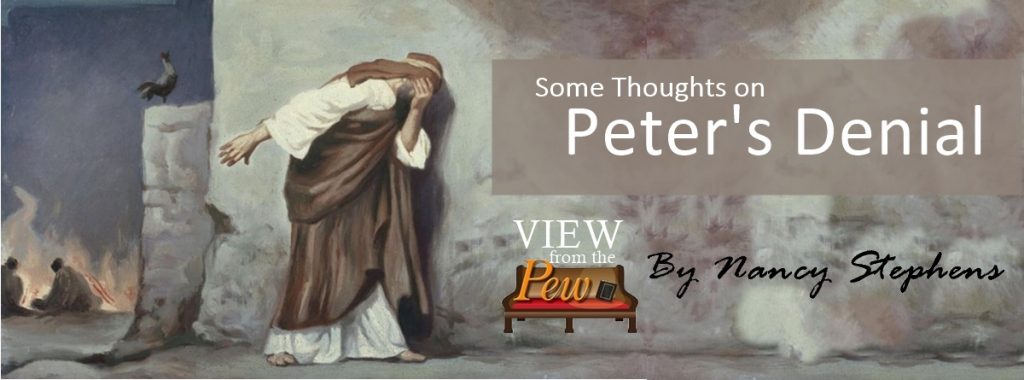
Some Thoughts on Peter’s Denial
In reading the Gospel accounts leading up to the crucifixion, I am always challenged by how quickly Peter went from bravely declaring his willingness to die for Jesus to fiercely denying that he even knew Him. I am sure that Peter’s boast that he would never desert Jesus came from his heart and he meant it with every fibre of his being. He had given up his fishing business and spent three years as one of Jesus’ disciples. Listening to Jesus and seeing His miracles had touched his heart so that he had finally come to understand and believe that Jesus really was the Messiah, the Son of God.
What was it then that led him to deny his Lord? Fear? Perhaps, though I think Peter was not easily frightened. After all, just hours earlier he had drawn his sword to defend Jesus as He was being arrested. I think that proves he really was ready to put his words into action. And though most of the disciples did desert Jesus at that time, Peter and John followed Him right into the courtyard of the High Priest’s residence. That, too, shows some measure of courage.
Still, there is no getting around the fact that Peter denied he was a follower of Jesus, not just once, but three times. As I pondered this again recently, some words of Jesus stood out to me with fresh meaning. In Luke 22: 31-32 Jesus says, “Simon, Simon, Satan has asked to sift all of you as wheat. But I have prayed for you, Simon, that your faith may not fail. And when you have turned back, strengthen your brothers.”
To this, Peter replies, “Lord, I am ready to go with you to prison and to death.” (v. 33) Jesus answered, “I tell you, Peter, before the rooster crows today, you will deny three times that you know me.” (v. 34) We know that Peter remembered Jesus’ prediction about his denial, for we read in Luke 22:61-62, “Then Peter remembered the word the Lord had spoken to him: ‘Before the rooster crows today, you will disown me three times.’ And he went outside and wept bitterly.” I wonder if he also remembered what Jesus said about Satan sifting him? Jesus’ warning about Satan’s role in this reminds me of the story of Job. God gave permission for Satan to attack Job’s family, possessions and health. The book of Job is certainly a challenging read, as it pulls back the curtain on a spiritual reality behind this physical world. That same spiritual battle between God and Satan is displayed throughout the New Testament.
For all his bravado, Peter was not prepared for the tests and temptations that Satan would throw at him. First, he failed to stand watch with Jesus as He prayed in the Garden of Gethsemane, though Jesus had cautioned them saying “Pray that you will not fall into temptation.” (v. 40) Then, he resorted to his own methods to defend Jesus by swinging his sword and cutting off the ear of the High Priest’s servant. Yes, it was an act of love and bravery, but totally out of sync with what God was doing behind the scenes. I expect Peter was hurt and confused that Jesus did not resist arrest, and that He actually healed the servant’s ear! Finally, Peter’s failure as a disciple is complete when he denies knowing Jesus. He had boasted he would never leave Jesus, yet Peter was not with John and the women at the foot of the cross. No doubt he was too devastated to show his face, torn apart with grief and shame. All he thought he knew about Jesus seemed to have come to nothing! And what he thought he knew about himself had also proved false.
But God was not done with Peter yet. Jesus had prayed for him, that his faith would not fail. (v. 32) Surely it was God’s grace that sustained him through those dark hours after the crucifixion, when all seemed lost. Though Peter witnessed the empty tomb, there is no indication that he understood the resurrection until we read in Luke 24:34, “The Lord has risen and has appeared to Simon.” We are not given any details about this private moment between Jesus and his guilt-ridden disciple, except a glimpse of Jesus’ love and forgiveness, as He reaches out to Peter to restore their relationship.
I am sure this was a lesson in spiritual warfare that Peter never forgot, evidenced by the words in his epistle: “Be alert and of sober mind. Your enemy the devil prowls around like a roaring lion looking for someone to devour. Resist him, standing firm in the faith, because you know that the family of believers throughout the world is undergoing the same kind of sufferings.” (See 1 Peter 5:8-9.) What was true in Job’s day and in Peter’s day is also true today. There are spiritual battles raging all around, both globally and personally. Thankfully, God is not done with us or our world. May we be encouraged as we remember that Jesus is alive and is still praying for His own, so that our faith will not fail in our time of testing.
© Nancy Stephens April 2021
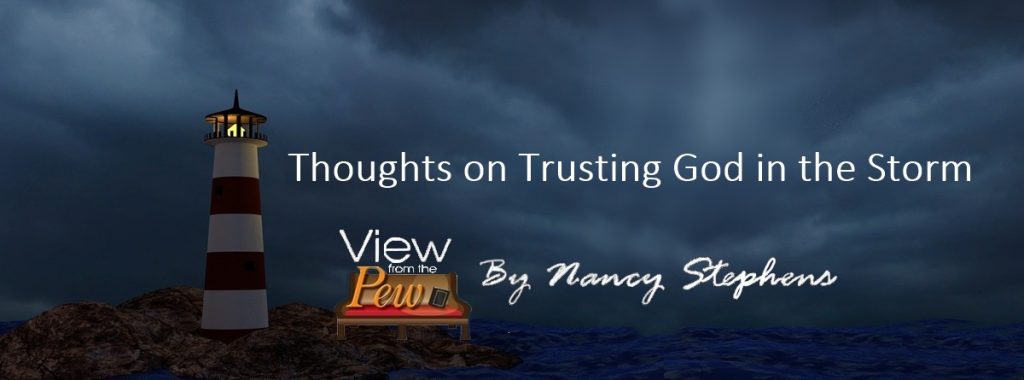
Some Thoughts on Trusting God in the Storm
The pandemic we have been experiencing for almost a year now can be likened to a storm of global proportions. While some countries are suffering more than others, no country is exempt from its impact. The same can be said of individuals – some who get Covid-19 suffer more than others. Even those who have not contracted it still feel the negative effects of public health restrictions, i.e. economic hardship, social isolation, etc.
Of course, there are many types of storms that can wreak havoc in our lives, perhaps the death of a loved one or a serious illness or the loss of employment. A global pandemic is a rare event. Personal storms are much more common. But the thing about all such “storms” is that we cannot control them. They often burst upon us without warning, so that we do not even have time to prepare. The more severe the storm, the greater the impact on our lives, causing us to reel in shock and to question what is going on. Why did this happen? Where is God? Is He punishing me? Why would a loving God allow this to happen? Such questions are natural and I do not think God is offended by them, though neither do I think He offers us easy answers. However, I am confident that the Bible does give us truths that can help us weather whatever storms life may throw at us. To be sure, we live in a broken world that is full of suffering and is groaning under the consequences of sin on every level – whether from natural disasters, human activity or the devil’s attempt to destroy God’s good creation. God has not promised to shield His people from every bad thing that may happen, but He has promised to be with them. “Never will I leave you; never will I forsake you” (Heb. 13:5) – a truth we can cling to when a storm hits.
Another foundational truth is that God is good. 1 John 1:5 tells us, “God is light; in him there is no darkness at all.” God is not the cause behind the bad things that happen in this world. Rather, He is at work in the world to put things right through the death and resurrection of His Son. He is always reaching out to help us in our times of trouble. It is up to us to respond. Will we trust Him even when we are hurting and do not understand what is happening? Perhaps God does not shield us from bad things because He knows He can use them for His purposes in our lives. He tells us, “As the heavens are higher than the earth, so are my ways higher than your ways and my thoughts than your thoughts.” (Isaiah 55:9) God’s ways are not just different, they are better. Sometimes it is the storm itself that drives us closer to Him. C. S. Lewis has said, “Pain insists upon being attended to. God whispers to us in our pleasures, speaks in our consciences, but shouts in our pains. It is his megaphone to rouse a deaf world.” (from The Problem of Pain)
Another truth that can steady our hearts in the midst of a storm is to remind ourselves that God loves us. It is not simply that God does loving things. Love is His very essence. All His other attributes of power, knowledge, holiness, etc. are circumscribed by love. An all-powerful deity who wielded His power apart from love would be very scary indeed. God’s love is vast enough to encompass all humanity, and yet personal enough to love us each as an individual. The scriptures tell us that God is so intimate with us that He knew us while we were still in the womb. He even counts the hair on our heads! If He feels distant to us, it may be that we are the one keeping Him at arm’s length.
Clinging to these truths may not answer all of our questions, but they will certainly help anchor our souls even in the fiercest storm. How? By enabling us to trust in God – that He loves us, that He can use this for good in our lives and that He is with us in every circumstance. Life’s storms often happen without warning, so we would do well to prepare ourselves in advance by taking time now to deepen our knowledge of God through His word and in prayer. It will be time well spent and will nourish our souls and strengthen our faith against the doubt, depression or despair that may threaten to overwhelm us when a storm rages in our world, whether it be global or personal.
May our hearts echo the Psalmist – “God is our refuge and strength, an ever-present help in trouble.” (Psalm 46:1)
© Nancy Stephens, January 28, 2021

Some Thoughts on Thankfulness
As 2020 drags on, there are now signs of a second wave of Covid-19 beginning to sweep across the country. Rather than grow anxious, I choose instead to turn my thoughts to all the good things that I enjoy, which seems especially fitting as we approach Thanksgiving. I am sure readers will also have many things they are thankful for, but here are a few on my list.
First, I am thankful for the peace that comes from knowing Jesus as my Lord and Saviour. My experience of His love and faithfulness over many years encourages me to trust Him during these uncertain times.
Second, I am thankful to live in New Brunswick and am grateful for the way our leaders have handled the pandemic. I think the rest of the country may be starting to wish they could join us in the Atlantic Bubble! Of course, our geographical location and small population are major factors in our success at curtailing the spread of Covid-19, but credit also goes to leaders who took swift and determined actions in the early days and have not succumbed to pressure to let down our guard.
Third is the good health I enjoy, not something I take for granted. As I enter my mid-60s, I definitely see lots of signs of aging! Still, I have no major health problems and take no prescribed medications. My mother lived to be 97, so perhaps I inherited her good genes. On the other hand, my father died of Alzheimer’s at age 84, and I am sure I share some of his genes too. Rather than worry about whose genes I have, I choose to give thanks for my current good health. Each day is a gift from God.
Next, I am grateful for my family, especially my sisters here in Fredericton. During the initial lockdown, it was very strange not to be able to spend time with them. Feelings of isolation were starting to take hold, until we were able to form a household bubble in late April and life began to feel a bit more “normal” again.
I am also grateful to be part of a vibrant faith community – St. John the Evangelist in the Parish of Douglas and Nashwaaksis. Like most churches, we are grappling with how to adjust to the restrictions during the pandemic. How do we worship together, when only a limited number are allowed to meet on a Sunday? How do we stay connected with those who are still isolated at home? How do we minister to people in the community? What will our church look like when this is all over? I am truly thankful to be part of the body of Christ, as we seek to understand what God is saying to us in these days.
As I type this, I am sitting in my living room and looking out at trees garbed in brilliant fall colours of red, yellow and gold. It is easy to be grateful for the natural beauty in this part of God’s creation. I also enjoyed some star gazing this summer – first it was the Neowise Comet, then the Perseid Meteor Showers and finally the Milky Way. Truly, as the Psalmist says, “The heavens declare the glory of God!” (Psalm 19:1)
Being thankful is a choice. It would be easy to be overwhelmed by all the challenges and hardship that 2020 has brought. But as a follower of Jesus, I look to Him to help me in every circumstance – whether it is to thank Him for each blessing or trust Him for each trial. The Apostle Paul exhorts us, “Sing and make music from your heart to the Lord, always giving thanks to God the Father for everything, in the name of our Lord Jesus Christ.” (Ephesians 5:19b-20, NIV) I am a fan of the musician Fernando Ortega, so I will close with words from one of his songs that has been especially meaningful to me throughout 2020.
“With all my heart I love you, Sovereign Lord. Tomorrow let me love you even more. And rise to speak the goodness of your name, until I close my eyes in sleep again.” Words I try to live by, one day at a time.
© Nancy Stephens October 2, 2020
The song Nancy refers to is “Jesus, King of Angels”. You can find it on two of his albums: “The Breaking of Dawn” (1998), and, more recently, “Christmas Songs” (2008). Below is a link to the song Nancy mentions from Youtube:
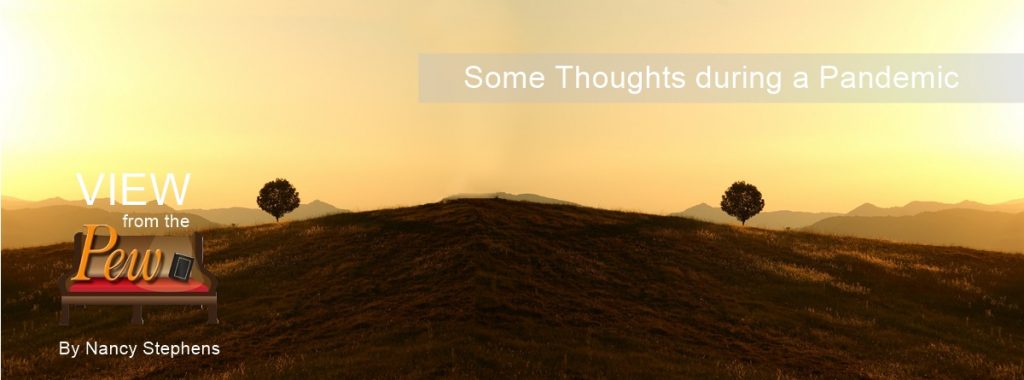 Some Thoughts during the Pandemic
Some Thoughts during the Pandemic
The Covid-19 Pandemic has turned our world upside down. Life as we have come to know it has ground to a halt. Such an abrupt stoppage of all non-essential activities has resulted in an economic collapse not seen in our life time. There are echoes here of the Spanish Influenza Pandemic of 1918-1919. But the world has changed a lot since that time, especially in terms of the dissemination of information. In our globally connected world, we can see the worldwide, devastating impact of the pandemic streaming 24/7 on every media platform. Of course, that does not mean we should watch it 24/7! But I am committed to being a world Christian, which I understand to mean that I should know and care about what is happening in the world. So, yes, I do keep up on the news, in measured doses.
The pandemic compounds the existing misery in the world, such as the plight of millions of refugees, unimaginable human suffering caused by wars, acts of violence, etc. We also have a rise in extremism in various forms from Muslim terrorist groups to ultra-nationalist parties to white supremacists, etc. The result? Our world is in crisis. Many may ask, where is God in all of this? Personally, I do not view the pandemic as God’s judgement. Of course, I do believe a day is coming when God will judge the world, but I do not think that is today. Today is the day of salvation. (See 2 Corinthians 6:2.) When I consider the chaotic mess our world is in, I picture God weeping over it, much as Jesus wept over the city of Jerusalem. So rather than blaming God for things, I think we should acknowledge that the world is what we have made it. Of course, as individuals, we do not all share the same level of culpability. But the truth is, sin is at the root of all of our problems, personally and globally.
So where is God? I was recently encouraged when I read Paul’s sermon in Athens recorded in Acts 17:16-34, where he proclaims that God is Sovereign, the Lord of heaven and earth. I was especially drawn to verse 26: “From one man he made all the nations, that they should inhabit the whole earth; and he marked out their appointed times in history and the boundaries of their lands.” The word “nations” here refers to ethnic groups, not political entities. I do not pretend to understand how God’s sovereignty interacts with the freedom He has given us to make choices as moral beings made in His image. Still, I am comforted by Scripture’s clear teaching that God is sovereign and that He is active in our human affairs. As someone has said, “History is His Story.”
When I think about the challenges we face as a human race, I am relieved to know that God is still in control. Nothing is beyond His power to influence. Thankfully, He exercises His sovereignty in keeping with His character. 1 John 1:5 tells us: “This is the message we have heard from him and declare to you: God is light; in him there is no darkness at all.” There is no moral ambiguity in God. He is not a capricious god toying with us. He always acts out of His goodness and love.
In Acts 17:27, Paul speaks of God’s purpose behind His rule over the nations – “God did this so that they would seek him and perhaps reach out for him and find him, though he is not far from any one of us.” God is actively seeking to draw people to Himself. This truth shapes my prayers. I pray that God will bring good out of this pandemic – that He will draw many people to faith in Christ, that He will purify and revive His church, that He will help us to create a better, more compassionate, post-pandemic world.
Speaking of a post-pandemic world is a bit premature. If history teaches us anything about pandemics it is that they come in waves. Thankfully, the first wave is slowly subsiding here in Canada. Only God knows when the next wave will come. May we keep our eyes on Him and trust in His love and grace to see us through whatever lies ahead.
© Nancy Stephens May 2020

Some Thoughts during Easter 2020
What a year 2020 has been for our country so far! First, we had the incident where Iran shot down an airplane with many Canadians on board. Then we had the dispute over First Nations land rights, which spilled over into blockades of rail lines in various places across the country. Now, since mid-March, we have been in the grip of the Covid-19 Global Pandemic. This has led to very strict orders from our government, both provincial and federal, for the end to all non-essential work and travel, and for physical distancing from each other. In other words, we are to stay at home as much as possible. All of this is necessary, if we are to “flatten the curve” of the infection rate and keep the pandemic from overwhelming our hospitals. Collateral damage from all of this is an economic melt down that is greater than the Recession in 2008 and even the Great Depression in the 1930s. In short, this is the worst global crisis since World War II.
In time of war, our country mobilized its citizens in the war effort, whether it was to join the armed forces and fight overseas or to work in factories and service industries here at home. It was a joint effort that engendered strong social connections and a willingness to sacrifice to ensure victory. The enemy then was visible and the threat very real. Though the threat today is invisible, it is still very real. We can see the devastation of the coronavirus in the on-line stats of infections and deaths, as well as in the daily news reports showing lines of coffins in morgues and even being loaded into cold storage trucks. So far, Canada has managed to cope and is better off than many other nations, especially the USA and Europe. Still, many have died here and the fear is that many more will lose their lives before this outbreak is finished.
What are we to make of this crisis that has turned our world upside down? It is easy to be overwhelmed by it all. Fear of catching the disease has been compounded by the fear of not having enough money to pay the rent or mortgage or to buy groceries and medicine. The suddenness and uncertainty of it all is causing anxiety levels to skyrocket. Fear and anxiety are natural responses. If we did not feel some of both, we would not be human. Still, this is a time to practice what 1 Peter 5:7 says, “Cast all your anxiety on Him because He cares for you.” We need to find peace and refuge in God.
It is also a good time to reflect on what we may learn from this crisis. Perhaps it will show us if we have looked to our financial resources for our sense of security, or if we have taken our good health for granted. Maybe we will discover how important our family and friends really are. We may also discover how hard it is to be still, when we are used to being on the go. We may even realize that each day is a gift and that any plans we make for the future need to be held loosely.
My thoughts are drawn to words from Psalm 11: “‘When the foundations are being destroyed, what can the righteous do?’ The Lord is in his holy temple; the Lord is on his heavenly throne.” Though the foundations of our daily lives have been shaken, God is still sovereign over the affairs of this world. I do not view this situation as God’s judgment on the world. While sickness is the result of sin and not part of God’s original plan for the world, humanity has endured disease in many forms over many centuries. We are not exempt from it in the 21st century, despite our medical advances. As Christians who believe in God’s sovereignty and power, our response should be to pray that He will have mercy on the world and bring this pandemic to an end as quickly as possible. We should pray for our medical personnel fighting in the front lines, for our political leaders seeking to make right decisions under tremendous pressure, for all workers keeping essential services going, for the recovery of the sick, for families who are grieving for loved ones cut down by this virus, for the lonely and isolated, for the unemployed, and the list can go on! Prayer is the right response in this situation, as we cast ourselves on God’s mercy and ask for His divine intervention.
Though we cannot celebrate Easter by gathering together in our churches, we can still remember Christ’s sacrifice and celebrate His victory over sin and death. In so doing, may we be reminded that God is not distant or indifferent to what we are experiencing. He gave His Son to die for our sins. That is how much He loves this world. May this crisis cause many people to see His love through the kindness of others and recognize their need for Him. And when the crisis is over, may our churches be filled, with people who have stayed faithful to Him throughout and also with lots of new people who have recognized their need to make space in their lives to get to know the One who made them and who loves them so much that He sent His Son to the cross to bear the punishment for their sins. That is what the Easter Season is all about!
© Nancy Stephens April 2020
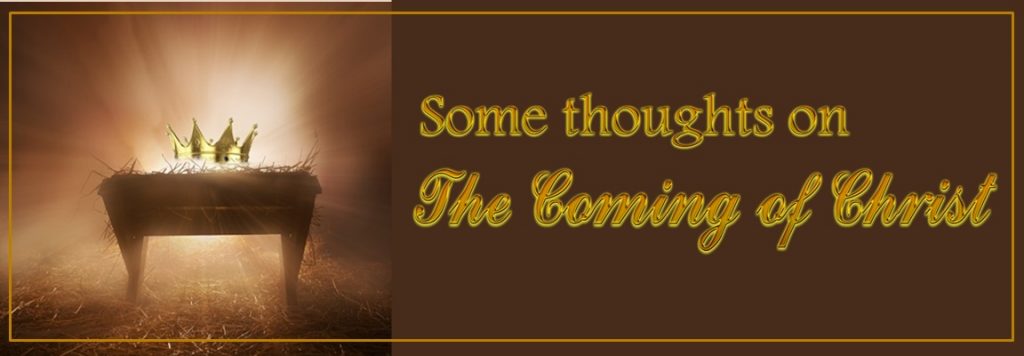
Some Thoughts on the Coming of Christ
Throughout this Advent Season, I have been thinking often about Isaiah’s prophecy in Isaiah 9:1-7. He speaks of light and hope at a time when the people of Israel were living under the threat of the Assyrians. His words in verse 6 are the most familiar to us – “For to us a child is born, to us a son is given….” This promise of a Messiah, made in about 700 B.C., was fulfilled when Jesus was born in Bethlehem. Think of it, they waited 700 years! Of course, no one waits more than their life-time, but as the people of God, it was a long time to maintain hope that their Messiah really would come.
Part of that 700 years spans the period between the close of the Old Testament and the start of the New Testament. Silence…no new word from God for 400 years! We can well imagine that many would grow weary of waiting for their Messiah. Some may have become so sick and tired of hearing what seemed like empty promises that they gave up their faith completely.
Why the silence? What was God doing? I do not pretend to know what was in the mind of God, but I do know that if we look at the history of that period, we can see a couple of very significant things. In a period of war and turmoil among many kingdoms, there was the rise of Alexander the Great, king of ancient Greece, who went on to “conquer the world.” With him came the expansion of the use of Greek as the “trade language” of that time. Another significant event was the establishment of the vast Roman Empire. The Romans were well known for building roads to help move their armies and trade goods throughout their Empire.
In Galatians 4:4, we read, “But when the set time had fully come, God sent his Son….” The Bible is very clear about the Sovereignty of God. He is the One who rules over the affairs of men. Though it may have appeared at the time that God was not doing anything, to eyes of faith, it is very clear that He was preparing the then known world for the coming of His Son. The Roman roads made it much easier for the Apostle Paul and others to travel throughout the Roman Empire spreading the Good News of Jesus Christ. And the eventual spread of the Gospel was made much easier through the Greek language, which was used to write the New Testament. No doubt, there were many other things, like the Roman census that took Joseph and Mary to Bethlehem, that God in His sovereignty arranged to happen in His perfect time.
The birth of Jesus fulfilled the OT prophecies, including those of Isaiah. Sadly, most Jews did not recognize Jesus as their Messiah. They were hoping for a political leader who would rescue them from the Romans. Instead, God sent them a Saviour to rescue them from their sins. While many of the early Christians were Jews, the Gospel also soon spread to the Gentiles. God’s plan of redemption was far greater than the Jews could ever have imagined. As the Gospel of John states: “He came to that which was his own, but his own did not receive him. Yet to all who did receive him, to those who believed in his name, he gave the right to become children of God.” (John 1:11-12) Praise God for that!
Christmas is the time we celebrate Christ’s first coming. It is also a time that reminds us of His second coming. The Bible contains many such promises of His return. The first time He came as Saviour, but the next time He will come as Judge. (See Hebrews 9:27-28.) While the people of Israel waited 700 years for Isaiah’s prophecy to be fulfilled, the Church of God has been waiting for nearly 2000 years for Christ’s Second Coming! It would be easy to lose hope and to think the promise is not true, but that would be a mistake. God is faithful and will keep His promise when the time is right. Peter tells us: “The Lord is not slow in keeping his promise, as some understand slowness. Instead he is patient with you, not wanting anyone to perish, but everyone to come to repentance.” (2 Peter 3:9) It is evidence of God’s love and mercy that Christ has not yet come back.
Still, we have the words of Jesus Himself – “I am coming soon!” (Revelation 22:7, 12, 20) As surely as He came the first time, He will come again. May we continue to live in that hope. “Even so, Lord Jesus, come!”
© Nancy Stephens, December 24, 2018

Some Thoughts on Evangelism
The New Testament has three passages that list gifts that Christ has given to His people by the Holy Spirit: Romans 12:4-8; 1 Corinthians 12: 1-31; Ephesians 4: 7-13. The word “evangelist” appears just once in the three lists of gifts, in Ephesians 4:11-12 where we read, “So Christ himself gave the apostles, the prophets, the evangelists, the pastors and teachers, to equip his people for works of service, so that the body of Christ may be built up….”
I find it significant the gifts listed here are all stated as being people. The focus is on people who are gifted as evangelists, not on “evangelism” which refers to a program or ministry that a church may have. In fact, the word “evangelism” does not appear in the Bible at all! That underscores the fact that the “mission” of the church is not about programs; it is about people. An evangelist, literally “a messenger of good,” is someone gifted by the Holy Spirit to tell others the Good News about Jesus Christ.
Some evangelists are gifted to boldly proclaim the Gospel to large audiences, while others with this gift exercise it in quieter ways, sharing the Gospel one-on-one. The NT gives us examples of evangelists, such as in Acts 2 when Peter preached on the Day of Pentecost and three thousand came to faith in Christ. In Acts 8 we read of Philip, another gifted evangelist, who preached the Gospel throughout Samaria. Of course, another wonderful example of an evangelist is the Apostle Paul who preached the Gospel boldly on many occasions, sometimes in hostile circumstances.
A modern-day example is Billy Graham. Hundreds of thousands of people came to faith in Christ through Billy Graham’s crusade ministries. Hundreds of thousands more tuned into his crusades on TV and realized their need for Christ. No doubt thousands of others quickly switched channels because they feel uncomfortable listening to that kind of religious broadcasting! Those are two very common reactions to evangelists. People either listen and respond by allowing God to work in their lives, or they put up resistance and try to silence the conviction rising in their hearts.
For the person gifted by the Holy Spirit to be an evangelist, sharing their faith comes naturally or perhaps I should say “supernaturally.” They do not need to force themselves to tell others about Jesus. They simply exercise the gift God has given them. I think that is true of all spiritual gifts. When we are using the gifts God has given us, whether it is teaching or serving or giving, we feel an inner compulsion to do it. It is not that it no longer takes any work on our part, but somehow it just feels right. We feel alive, empowered by the Holy Spirit, and experience a lot of joy in doing what we are gifted to do.
Coming back to the word “evangelist,” it is mentioned in 2 Timothy 4:5, where Paul writes to Timothy saying, “But you, keep your head in all situations, endure hardship, do the work of an evangelist, discharge all the duties of your ministry.” From what the NT says about Timothy, we get the picture that he was a young, shy and timid person, not exactly the picture of an evangelist who is gifted to preach the Gospel boldly! Yet, here we have Paul telling him to “do the work of an evangelist.” Though we may be more like Timothy than we are like Paul, if we are a follower of Jesus Christ, we too have a calling to share the Good News with others. The question is, how can we do that, if we are not gifted as evangelists?
Michael Frost’s book “Surprise the World”1 has some very helpful things to say to us about that. He speaks of a two-fold approach to evangelism, i.e. those who are gifted as evangelists are to proclaim the Gospel boldly, while believers not gifted as evangelists are to give answers to those who ask them questions. Frost speaks of the need for followers of Christ to live questionable lives! By that he means, the way we live should make people ask us questions about what makes us tick; why do we go to church; why do we seem to be at peace, even in the midst of sickness or the loss of a loved one or the flooding of our property. Frost challenges us to form missional habits that will help us in our outward journey into our communities, as well as in our inward journey. Nurturing these habits will help us grow in relying on the Spirit to guide us as we go about our daily lives, making us aware of people and their needs and giving us words to bless, encourage and answer their questions about our faith. As Peter says in 1 Peter 3: 15-16: “Always be prepared to give an answer to everyone who asks you to give the reason for the hope that you have. But do this with gentleness and respect….”
A lot of people, sincere Christians, think that faith is a personal matter. They believe, but it is not something that they talk about. I wonder why? We talk about a lot of things, why not our faith? Perhaps we are afraid of offending people or afraid of what they will think of us. I have heard evangelism described as “One beggar telling another beggar where to find food!” We are all in the same boat. We are all very needy people. Sharing our faith is not about preaching at people. It is about helping them know where they can find forgiveness, peace of heart and help in their daily struggles. Of course, we cannot share what we do not have! So, the first thing we must do is to respond to Christ’s offer of forgiveness in our own lives. But once we have found forgiveness, help, comfort, hope and strength in Christ, why would we keep it to ourselves?
Let us ask God to help us live our faith more openly and give us courage to speak up when the opportunity arises. I believe that as we are more intentional in forming missional habits, as Frost writes about, then we will grow in this area of sharing our faith. People may argue against “religion,” but they cannot really refute our personal testimony of what Jesus means to us or what he has done in our lives. Sometimes that is all it takes to be a link in the chain that God can use to draw someone to Himself.
1 Michael Frost, Surprise the World: the Five Habits of Highly Missional People (NavPress Publishing Group, 2015)
© Nancy Stephens, July 2018

Some Thoughts on Self Worth
Many people struggle with low self-esteem. Perhaps that is not too surprising, as the media bombards us with messages that to be successful in life we need to have the biggest house, the fastest car, the nicest clothes, the latest gadget, etc. The escalating levels of household debt indicate the impact of this marketing. However, if we buy into this view of life, then we fall into the trap of judging our worth by the things we can purchase. And if we can’t keep pace, then we may begin to feel like failures.
Or sometimes we measure our worth by the things we do, as a kind of proof that we are valuable members of society. If we are not careful, we may get so busy doing things, even good things, that we end up overwhelmed. We start to feel inadequate or fearful of disappointing people by failing to live up to their expectations or our own. Life may begin to feel like a vicious circle, spiraling downward and leaving us exhausted and empty. The result? Our feelings of self-worth plummet. When that happens, the same media that pushed their marketing agenda on us, then tries to sell us schemes to increase our self-esteem!
Though our society puts great emphasis on possessions, education, looks, accomplishments, etc., none of these are a good way to measure our self-worth. Our value as people comes not from what we have or do, but from who we are. So, who are we? We often answer that question by saying what we do. Who am I? I’m a teacher or a bus driver or an office worker. Or perhaps we answer it in terms of relationships. I’m so-and-so’s mother or wife or daughter. While thinking of ourselves in relation to our work or loved ones does give meaning to our lives, this really isn’t a good basis for our self-worth.
If we have been able to build a “successful” life, great! But does that somehow make us better than others? The world may think so, but our sense of self-worth should not be built around what we have or do or even around our family. Possessions, status, and family are all subject to change. If we were to lose any or all of them, would that mean we no longer have any value? Again, the world may think so, but God has a different measuring stick. Scripture teaches us that our value as human beings comes from two facts: 1) we are made in the image of God and 2) He loves us.
In Genesis, we read that God made us in His image. When He formed the first person, Adam, out of the ground, He breathed His life into Him so that he became a “living being.” (See Genesis 1 & 2.) This sets us apart from the animals, who have a conscious life, unlike plant life, but who do not share the same life of God which was given to human beings. Mankind is the pinnacle of God’s creation. We see this not just in the order of creation, but also in the authority God entrusted to us to govern the plants, animals, land and water in ways that would provide for our needs, while also caring for them. Tragically, sin entered the world through Adam and Eve’s disobedience, thus separating them and their descendants, the entire human race, from God. Our sin has also had an impact on the rest of creation, as seen in our dismal record as stewards of the earth. Still, God’s image remains in us and is reflected in things such as our intelligence and capacity to reason and make moral judgments.
The second fact that provides the basis for our self-worth is God’s love. God not only made us in His image, but He also loves us. The greatest proof of His love can be seen in His willingness to send His Son into the world. Christ revealed His Father’s love and mercy throughout His earthly life. It was this love that led Him to the cross, to pay the penalty for the sins of the whole world. The fact that not everyone accepts God’s gift of salvation offered to all who believe in Christ does not negate His love for them and the value they have in His eyes.
These two great truths provide the foundation for a proper sense of self-worth. Embracing them will go a long way to addressing the struggles we may have with low self-esteem. It will also correct any false sense of worth we may have that is based on measuring ourselves according to the world’s standard of success. More over, it will show us the importance of treating every human being with respect and dignity. No matter what their social status or level of material wealth, every person is of infinite value because they are made in the image of God and He loves them. If we live by these truths and teach them to our children and grandchildren, then perhaps we can make progress in addressing the problems of bullying, prejudice and racism that plague our society. And bit by bit, we could help make the world, or at least our corner of it, a better place for all.
© Nancy Stephens, September 2017

Some Thoughts on Faith
The Gospels give many accounts of Jesus performing miracles of healing. Two stories recorded in Luke 8:40-56 are among my favourites. One is the story of Jairus, a leader of a synagogue, whose 12 year-old daughter was dying. The other is of a woman who had suffered with bleeding for 12 years. Jairus obviously had heard of Jesus’ power to heal people, so in his desperation, he came and pleaded with Him to come heal her. The woman had also heard of Jesus, but how could a woman who was ceremonially unclean dare approach Jesus directly? She was forced to find a more discreet way to get the healing that she too wanted so desperately.
Luke tells us that as Jesus and His disciples were on their way to heal Jairus’ daughter, they were followed by a crowd. In the midst of all the jostling of people around Jesus, the woman found a way to get close enough to reach out and touch the edge of His cloak. The instant she touched Him two things happened – her bleeding stopped and so did Jesus! He stopped to ask who had touched Him. Given the fact that people were crushing up against Him all along the way, it seems pointless to ask such a question! Still, Jesus knew that someone who touched Him had just been healed because He felt power go out from Him. As He scanned the faces around Him to find the person, the woman slowly emerged from the crowd. Having sought earlier to keep herself hidden from public scrutiny, she now fell at Jesus’ feet and told Him everything. He was right, someone had been healed! His power had connected with this woman in deep need. How? Through her faith. While it’s true that many had touched Him inadvertently, hers was a touch sparked by faith.
Meanwhile, what of Jairus? Though this interruption was probably not long, it may have seemed like an eternity to Jairus. His worst fears were realized when someone came from home to tell him that his daughter had died. There was no use in having Jesus come now; it was too late to do anything. Before Jairus had a chance to react, Jesus reassured him, “Don’t be afraid; just believe, and she will be healed.”(v.50) I wonder what went through Jairus’ mind? He believed that Jesus could heal people and he had just witnessed His power at work in this woman. Did He dare believe that Jesus could bring his little girl back to life? I suspect that though he may not have known what to believe, he at least knew who to believe. He had come to Jesus in faith. Now Jesus was challenging him to believe Him at a deeper level than he could have imagined. We are not told what Jairus thought, but we do know that he continued to walk with Jesus all the way back to his home. He did not give up halfway there, despite the hopelessness of the situation, humanly speaking. In the end, Jesus did indeed bring his daughter back to life.
Here we have two people who reached out to Jesus in faith. In both cases, they received the miracle they had hoped for. As comforting as these accounts are, they also raise a question. Does Jesus always heal in answer to our prayers? No, we know He doesn’t. Probably everyone reading this article has a story to tell of a loved one who wasn’t healed. Hopefully, there are also some who can share about ones who were healed or delivered or saved in answer to prayer. I do not pretend to know why some are healed and others are not. That is hidden in the mystery of the sovereignty and wisdom of God. Still, I see in these two accounts things that do speak to me about faith.
Faith is more than wishful thinking. Both Jairus and the woman acted on their faith by coming to Jesus, the One they believed had power to heal. Do we also believe in Jesus and in His power to heal and to change circumstances that are beyond our control? When we are faced with a crisis or hopeless situation, what do we do? If we are people of faith, then we go to Jesus and ask for His help. If we are desperate enough, we even beg, just as Jairus did.
The object of our faith, Jesus, is more important than the size of our faith. Sometimes people feel guilty about not having enough faith. Or worse still, they are blamed by others who say that if only they had had enough faith, then God would have given them what they asked. That calls into question whether our faith is really in God or in our own capacity to believe! As sincere as we try to be, it’s sometimes hard for us to know the subtleties of our own hearts. But God sees and knows all things, and sometimes all we can do is kneel before the Lord and confess, “I do believe; help me overcome my unbelief!” (Mark 9:24, NIV)
One thing faith is not – it is not a bargaining chip or a means for manipulating God to do what we ask. Though God does respond to our faith and even reward it at times, He is not bound by it, because He alone knows what is best in every circumstance we face. Even Jesus prayed, “Yet not as I will, but as you will.” (Mathew 26:39, NIV) Faith should include an expression of our trust in God to do what is best. In no way should we misconstrue this to be a form of fatalism. Rather, it is the avenue by which we open ourselves up to God to do whatever He wants in response to our cries for help. As the writer of Hebrews so aptly puts it:
“Let us then approach God’s throne of grace with confidence, so that we may receive mercy and find grace to help us in our time of need. “ (Hebrews 4:16, NIV)
© Nancy Stephens, January 2017

Some Thoughts on the Authority of Scripture
Perhaps you have noticed that the Bible does not attempt to prove that God exists. Rather, its opening words assume His existence to be a fact – “In the beginning God created the heavens and the earth.” (Gen. 1:1, NIV) Just as we can tell a lot about a person by the quality of their craftsmanship, so we can deduce some of God’s attributes by looking at the world He created, i.e. His power and wisdom. As Psalm 19:1 states, “The heavens declare the glory of God.” Paul echoes this thought in Romans 1:20 – “For since the creation of the world God’s invisible qualities—his eternal power and divine nature—have been clearly seen, being understood from what has been made, so that people are without excuse.” Theologians refer to this as general revelation, meaning that creation reveals some truth about God, but falls short of conveying His moral character or His purposes and plans for what He created. For that, we must look to God’s self-revelation.
Praise God that He has revealed Himself to us. “In the past God spoke to our ancestors through the prophets at many times and in various ways, but in these last days he has spoken to us by his Son, whom he appointed heir of all things, and through whom also he made the universe. The Son is the radiance of God’s glory and the exact representation of his being, sustaining all things by his powerful word. After he had provided purification for sins, he sat down at the right hand of the Majesty in heaven.” (Heb. 1:1-3, NIV)
The authority of the Bible to judge between truth and error is based on our belief it is a reliable record of God’s self-revelation of His character, as well as of His purposes and plans for all of creation. His many revelations through the prophets are recorded, together with historical records of the Jewish people, in what we call the Old Testament. Similarly, the revelation of God through His Son Jesus Christ is recorded in the Gospels. These, together with the history of the early church and various letters circulated in those early days, make up what we call the New Testament. Some basic research on-line will quickly explain the process used first by Jewish rabbis and later by early church fathers to determine which writings reflected the truth of God’s message and were deemed inspired by the Holy Spirit. In the centuries since then, archeologists have uncovered many, many artifacts and manuscripts that substantiate the validity of the ancient texts which make up our Bible.
The Bible is the main source of our knowledge of God and the doctrines of the church are based on its teachings. As Paul said, “All Scripture is God-breathed and is useful for teaching, rebuking, correcting and training in righteousness….” (2 Tim. 3:16, NIV) Of course, there are many cults that twist the Scriptures to fit their own desires or that add some new doctrine supposedly from God. We need to examine these against the traditional, orthodox teaching of the church handed down through the centuries. There are also many different Christian denominations, reflecting differences in interpretation of some passages of Scripture. Still, we measure the soundness of a church by whether or not their teaching aligns with the Word of God.
That is why changing a major doctrine of the church to accommodate the shifting cultural norms around us is so very dangerous. Re-working a doctrine to emphasize one aspect of God’s character, such as love, while ignoring another facet of His character, such as holiness, is at best a very careless handling of His Word, or at worst evidence of a total disregard for the authority of Scripture. Failure to uphold the historical interpretation of the Word of God opens the door to an erosion of other doctrines as well. This is why Paul urged Timothy to guard the teachings handed down to him: “Timothy, guard what has been entrusted to your care. Turn away from godless chatter and the opposing ideas of what is falsely called knowledge….” (1 Tim. 6:20, NIV)
I certainly agree with making church more relevant in our culture and there is much we can do to bridge the gap, so that non-Christians will understand what we are about. But changing the message is not one of those things!
I grew up in a church which loves to sing “Faith of our fathers, holy faith! We will be true to thee till death.” (Frederick Faber, public domain) May we have the courage to hold to that same faith in the face of pressure from outside, and even from within the church, to make the teachings of the church more palatable to a society that has lost its moral compass.
© Nancy Stephens, November 2016

Some Thoughts on Finding Strength in God
Life can wear us down at times. Sickness, unemployment, marital problems, addictions, ageing, death of a loved one – these are just a few examples of problems that can be overwhelming. Christians are not exempt. Christ did not promise His followers a bed of roses. In fact, being a follower of Christ may actually make life more difficult, as Christians are called to embrace values vastly different from those of society, including those of family and friends. But that’s a topic for another time!
When we put our trust in Christ for our salvation, He does not immediately translate us to heaven! He needs His people to live out their faith and be salt and light in this dark world. It’s a matter of being in the world, but not of the world. But part of “being in the world” means that we also share in the problems common to all humanity suffering the consequences of sin. The key difference for Christians is that we can face our problems knowing that Christ has promised to be with us every step of the way. The challenge, of course, is to grab hold of this truth and truly seek to find God’s strength to help us during rough patches in life. The Bible contains many verses that encourage us to do just that:
“For we do not have a high priest who is unable to empathize with our weaknesses, but we have one who has been tempted in every way, just as we are—yet he did not sin. Let us then approach God’s throne of grace with confidence, so that we may receive mercy and find grace to help us in our time of need.” (Hebrews 4:15-16, NIV)
“Cast all your anxiety on him because he cares for you.” (1 Peter 5:7, NIV)
I think prayer is the first step to finding God’s strength. We sometimes find it easier to pour out our problem to a friend, than to talk to God about it. Yet, prayer draws us directly into the presence of the One who in His grace and mercy stands ready to help us. We do not need to pray in order to bring God up to date on our situation. He knows all about it already! And we certainly don’t need to tell Him what to do to help us, though we are free to ask whatever we desire from Him. Like a good parent, God delights to listen to His children and to give them what He knows is best for them. Sometimes that may mean changing our circumstances. Often it means changing our attitude. Whatever the end result, prayer is one way we can open our hearts up to God, acknowledge our need of Him and receive His strength to carry on.
We can also find strength through reading the Bible. Most of us would not think of going without food for a day. Imagine how weak we would be if we ate only once a week! Sadly, many Christians neglect feeding themselves on God’s Word, thinking that one short sermon a week is enough to keep them growing in their faith. However, faith needs to be nurtured daily by the truths of Scripture, and especially so during times when we are struggling. Through reading the Bible, we learn more about God and also more about ourselves. As we read, we should ask God to open our minds to understand it and give us grace to obey what it says. Many times we will find not just the strength to go on, but also the wisdom to know what to do about whatever is troubling us.
Another way to strengthen ourselves is through the church, Christ’s Body here on earth. Being faithful to join in corporate worship is key to growing in our knowledge and love of God and of His Son, Jesus Christ. It is also the way we experience being part of God’s family. We need the encouragement and prayers of our brothers and sister in Christ to help us face the ups and downs of life.
Praying, reading the Bible and being active in church are all ways that we can experience God’s strength. Still, I know there are times when even our best efforts and intents do not seem to give us the inner strength we need to cope. But Christ is still with us, even if we do not sense His presence through the fog of our emotions. We are probably all familiar with the poem “Footprints.” If not, you can often find it on the obituary page of the Miramichi Leader or you can Google it. The image of Christ carrying His child through the most difficult times seems to capture the loving heart of our Saviour. May we reach out to Him whenever the problems of this life threaten to overwhelm us.
© Nancy Stephens, September 2015